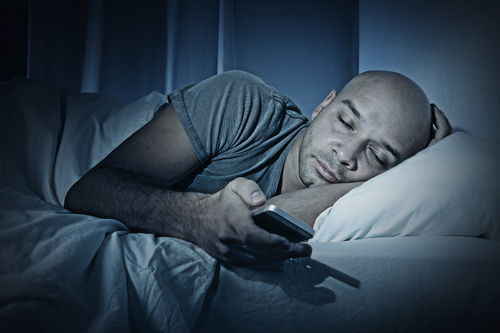
Many factors play into a lack of sleep: long working hours, extracurricular activities on top of homework, an uncomfortable sleeping environment, etc. However, one of the biggest problems today is spending too much time on screens.
How Technology Affects Your Sleep Habits
Smartphones, televisions, computer screens, tablets and laptops are everywhere. Most households have at least one of these devices, and some have all of them. They can be a constant distraction.
You may be tempted to stay up late with technology in the house. It’s easy to do:
You watch one show on your favorite streaming service, and when the episode ends, the next one starts rolling.
You play an online game and want to finish just one more level.
A friend calls right before bedtime, and you decide to have a video chat.
You work from home with the assistance of MDR and you want to finish something before you turn in for the night.
When these temptations are right there, it is hard to resist them.
Even when you manage to turn off your devices and go to bed on time, being in the room with them can cause distractions. You may hear notifications or your screen may light up. The sounds and lights can wake you and leave you wondering what you missed, rousing you from your sleep. If you check your device, the stimulation causes your brain to wake up and you may find it harder to fall back to sleep.
The blue light emitted from your screen disturbs your circadian rhythm. It causes changes in the production of melatonin, a hormone that helps you sleep.
How To Eliminate Technology in the Bedroom
It may feel difficult or impossible to remove all of the screens from your bedroom. People have become increasingly reliant on their devices, and keeping them somewhere else overnight can be daunting. However, if you are having trouble sleeping, it is worth the effort.
Find a place outside the bedroom where you can set up a charging station. Keep all of your devices in their parking spots where they can recharge at night (and you can recharge device-free in your bedroom).
Change your nightly routine. Bedtime rituals aren’t just for young children. Everyone can benefit from habits that tell the brain it’s time to relax. Take a bath or warm shower, put on your pajamas, brush your teeth, and settle in under dim lights. Reading is an excellent way to unwind as long as it’s on paper and not an e-reader.
Set a time after when screens are turned off every night and stick to it. When you have a designated downtime, it keeps you from checking your email just once more or watching the next show in your favorite series.
Let your coworkers, family, and friends know that you are off the clock after your designated time. Setting boundaries is vital to your well-being and it keeps you from feeling like you have to stay on guard all night.
Many people use their phones as alarm clocks. If you are used to that, try purchasing a basic alarm clock to replace it. Many models have battery backups so that you don’t have to worry about missing an alarm due to a power outage. Look for models that have dimmers to keep the bright light from disturbing you.
In today’s world of 24/7 technology, it can be challenging to keep your electronics from disturbing your sleep. If you give it a try, though, you may wonder what took you so long to get a good night’s rest.
A better way to unwind
Give yourself at least 30-90 minutes of gadget-free time before going to bed. This includes surfing your smartphone, reading on your device, or even watching television.
Making your room a technology-free zone can help eliminate the distractions of your devices. If you need to have your phone in your room, put it in a place where you won’t be tempted to look at it throughout the night.
Winding down with your electronics means that you can become dependent on technology to fall and stay asleep.
The number one way to get better sleep is to turn off your devices. Instead, find technology-free ways to help you calm down and relax. Technology-free methods to fall asleep include: a warm bath, taking an easy walk, reading a real book, meditating, or listening to calm music.
If you are worried about your ability to fall asleep, contact one of our sleep specialists today @ 907-357-6700. Sometimes, you need help in figuring out why sleep isn’t coming.









